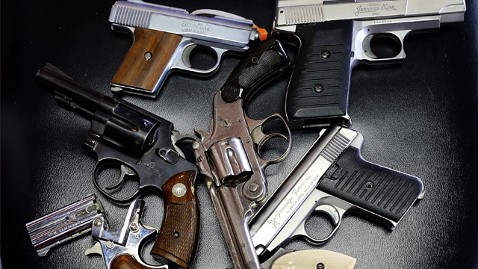The Case Against Gun Background Checks

Tom Pennington/Getty Images
With the fate of gun control as muddled as ever, the best hope for congressional compromise centers on the most popular policy move Washington could make: universal background checks.
The public supports other measures, but among all the limits on gun ownership that Democrats have advanced since the December shooting in Newtown, Conn., background checks enjoy the most support.
A Quinnipiac University poll last week showed 91 percent of respondents in favor of "requiring background checks for all gun buyers," compared with slimmer margins, 59 percent and 58 percent, for banning "assault weapons" and magazines that hold more than 10 bullets, respectively.
READ MORE: Clock Ticking on Gun Control Debate
To many, the idea of preventing criminals from buying guns seems like a no-brainer, regardless of whether they're stopped at gun stores, as current background checks have successfully done, or at gun shows or from private sellers, where background checks aren't required. Still, Congress is hung up.
Some Republicans have balked at universal background checks. The National Rifle Association opposes them. Why?
Here are a few arguments that have been offered up against the most popular move Congress could make on gun control. Underpinning most of the arguments is a similar idea, usually from conservatives: that universal background checks aren't worth an expansion of government power.
- Few prosecutions of denied gun buyers. Created under the Brady Handgun Violence Prevention Act of 1993 and implemented in 1998, the National Instant Criminal Background Check System allows licensed gun sellers to check with the FBI, as required by law, before making a sale. While background checks have prevented tens of thousands of unlawful gun sales each year, opponents have said that the government doesn't prosecute enough attempted buyers who are turned away. "The law right now is a failure the way it's working," National Rifle Association Executive Vice President Wayne LaPierre has said. According to Justice Department statistics supplied by the office of Sen. John Cornyn, out of more than 76,000 denials in 2010, 62 were referred for prosecution, and 13 resulted in guilty pleas or verdicts. Cornyn and LaPierre argued this point at a February hearing of the Senate Judiciary Committee on guns.
- There are already enough gun laws. At the same hearing in February, NRA's LaPierre argued that more robust prosecution of criminals for gun crimes would be more effective than instituting universal background checks. "The fact is, we could dramatically cut crime in this country with guns and save lives all over this country if we would start enforcing the 9,000 federal laws we have on the books," LaPierre said.
- They're an invasion of privacy. As opponents of gun control warn about privacy issues, background checks are tangled up with another proposal, that records of gun sales must be kept. In a March 22 letter to Senate Majority Leader Harry Reid, six GOP senators, led by Rand Paul of Kentucky and Mike Lee of Utah, warned that they would oppose any measures that involved "government surveillance." While it's not entirely clear what policy those senators had in mind, the American Civil Liberties Union has raised concerns about both records and background checks. "You just worry that you're going to see searches of the databases and an expansion for purposes that were not intended when the information was collected," Chris Calabrese, an ACLU privacy lobbyist, told The Daily Caller last week. Meanwhile, Sen. Chuck Schumer, D-N.Y., has made it clear that a "national gun registry" is illegal and won't be part of any Democratic gun bill.
- They might be too broad. Another concern raised by the ACLU's Calabrese was that, if a "transfer" of guns is defined too broadly, people with good intentions could unwittingly become criminals. "You worry about, in essence, a criminal justice trap where a lawful gun owner who wants to obey the law inadvertently runs afoul of the criminal law. … They don't intend to transfer a gun or they don't think that's what they're doing, but under the law they can be defined as making a transfer," Calabrese told The Daily Caller. The Heritage Foundation has said it is wary of any bill that would ban loaning guns to friends at gun ranges or on hunting trips.
- Criminals don't submit to background checks. This argument sounds a bit tautological, but the NRA argues that most criminals don't get their guns from stores, but on a black market. "My problem with background checks is, you're never going to get criminals to go through universal background checks," the NRA's LaPierre said at the February hearing of the Senate Judiciary Committee. "Gun shows … are not a source of crime guns, anyway. It's 1.7 percent." The Washington Post's fact-checker, Glenn Kessler, notes that this figure comes from Daniel Webster, director of the Johns Hopkins Center for Gun Policy and Research, who cites a 2004 survey of incarcerated gun-violence convicts about where they got their guns, in his new book "Reducing Gun Violence in America." A Johns Hopkins spokeswoman said the figure is probably higher, as some "friends and family members" who give guns to criminals (40 percent of inmates surveyed said they obtained their guns this way) likely get them from gun shows in the first place. The Brady Center has argued that surveys of prisoners underestimate how many criminals get their guns from private sellers and gun shows, and the center has chronicled cases in which criminals bought guns from private sellers and used them to kill people.
The stories of criminals who bought guns that would be prevented by universal background checks are, in many cases, heartbreaking. In 2009, the Brady Center released a report entitled "No Check, No Gun," disputing many of the cases made against universal background checks and chronicling instances in which they would have saved lives.
By 2009, the group argued, background checks had blocked more than 1.6 million prohibited purchasers from buying guns.